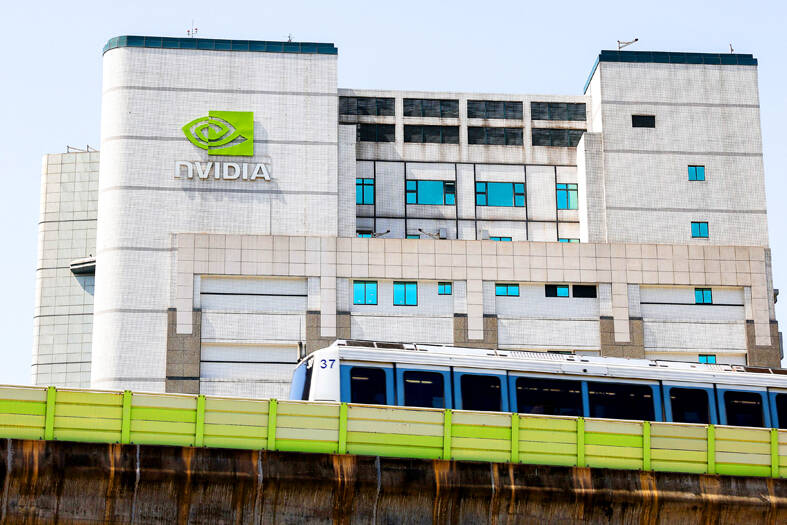US President Donald Trump’s administration has barred Nvidia Corp from selling its H20 chip in China, an escalation of Washington’s technology battle with Beijing that the company said would cost it billions of dollars and hamstring a product line it explicitly designed to comply with previous US curbs.
The US government on Monday informed Nvidia that the H20 would require a license to export to China “for the indefinite future.”
The rules address Washington’s concerns that “the covered products may be used in, or diverted to, a supercomputer in China,” the company said in a filing on Tuesday.

Photo: Ann Wang, Reuters
Nvidia said it would report about US$5.5 billion in write-downs during the current quarter, tied to inventory and commitments for the chip.
Nvidia’s shares yesterday fell 5.8 percent in premarket trading, while shares in rival chipmaker Advanced Micro Devices Inc (AMD) dropped 6.5 percent.
Asian tech giants also saw big declines. Taiwan Semiconductor Manufacturing Co (TSMC, 台積電) dropped 2.51 percent in Taipei, and testing equipment maker Advantest Co’s shares fell 6.7 percent and Disco Corp lost 7.6 percent in Tokyo. South Korean chipmakers Samsung Electronics Co and SK Hynix Inc were down by about 3 percent.
“An increase in US-China trade tensions prompted investors in the region to dump their stocks,” Moore Securities Investment Consulting Co (摩爾投顧) analyst Adam Lin (林漢偉) said, referring to the latest US Department of Commerce actions to impose export restrictions on Nvidia’s H20 and AMD’s MI308 chips, which are critical to artificial intelligence (AI) development.
“TSMC also remained concerned by the Trump administration’s threat to tariff semiconductors,” Lin said.
The new restrictions are among the clearest signs yet that Trump would stay the course on Washington’s efforts to limit China’s semiconductor and AI ambitions.
US officials first barred Nvidia and other AI chipmakers from selling their most advanced models to China in October 2022, over concerns that the technology could give Beijing a military edge. Since then, the China controls have ballooned to include an increasingly large set of semiconductor manufacturing tools, as well as a wider range of processors and high-bandwidth memory chips, which are essential for AI applications.
The news of the new controls came after US Senator Elizabeth Warren urged US Secretary of Commerce Howard Lutnick to impose restrictions on exports of Nvidia’s H20 and other advanced AI chips to China.
“I write with great concern regarding reports that the Commerce Department has paused its plan to restrict the export of powerful advanced AI chips like Nvidia’s H20 to the People’s Republic of China,” Warren wrote in a letter posted on the Web site of the US Senate’s Committee on Banking, Housing and Urban Affairs.
Former US president Joe Biden had not included the H20 chips in controls his administration placed on exports of advanced AI chips, it said.
The restrictions follow Nvidia’s announcement on Monday that it would build up to US$500 billion of AI infrastructure in the US over the next four years.
Additional reporting by CNA and AP

SEEKING CLARITY: Washington should not adopt measures that create uncertainties for ‘existing semiconductor investments,’ TSMC said referring to its US$165 billion in the US Taiwan Semiconductor Manufacturing Co (TSMC, 台積電) told the US that any future tariffs on Taiwanese semiconductors could reduce demand for chips and derail its pledge to increase its investment in Arizona. “New import restrictions could jeopardize current US leadership in the competitive technology industry and create uncertainties for many committed semiconductor capital projects in the US, including TSMC Arizona’s significant investment plan in Phoenix,” the chipmaker wrote in a letter to the US Department of Commerce. TSMC issued the warning in response to a solicitation for comments by the department on a possible tariff on semiconductor imports by US President Donald Trump’s

The government has launched a three-pronged strategy to attract local and international talent, aiming to position Taiwan as a new global hub following Nvidia Corp’s announcement that it has chosen Taipei as the site of its Taiwan headquarters. Nvidia cofounder and CEO Jensen Huang (黃仁勳) on Monday last week announced during his keynote speech at the Computex trade show in Taipei that the Nvidia Constellation, the company’s planned Taiwan headquarters, would be located in the Beitou-Shilin Technology Park (北投士林科技園區) in Taipei. Huang’s decision to establish a base in Taiwan is “primarily due to Taiwan’s talent pool and its strength in the semiconductor

An earnings report from semiconductor giant and artificial intelligence (AI) bellwether Nvidia Corp takes center stage for Wall Street this week, as stocks hit a speed bump of worries over US federal deficits driving up Treasury yields. US equities pulled back last week after a torrid rally, as investors turned their attention to tax and spending legislation poised to swell the US government’s US$36 trillion in debt. Long-dated US Treasury yields rose amid the fiscal worries, with the 30-year yield topping 5 percent and hitting its highest level since late 2023. Stocks were dealt another blow on Friday when US President Donald

Industrial production expanded 22.31 percent annually last month to 107.51, as increases in demand for high-performance computing (HPC) and artificial intelligence (AI) applications drove demand for locally-made chips and components. The manufacturing production index climbed 23.68 percent year-on-year to 108.37, marking the 14th consecutive month of increase, the Ministry of Economic Affairs said. In the first four months of this year, industrial and manufacturing production indices expanded 14.31 percent and 15.22 percent year-on-year, ministry data showed. The growth momentum is to extend into this month, with the manufacturing production index expected to rise between 11 percent and 15.1 percent annually, Department of Statistics